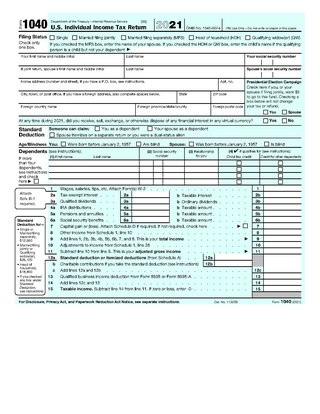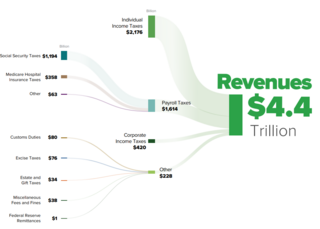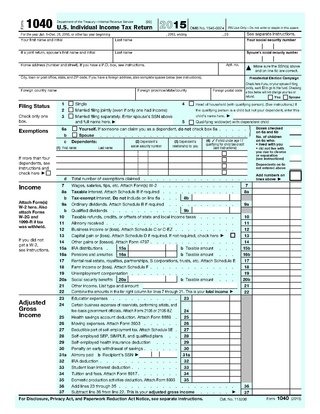Related Research Articles

Form 1040, officially, the U.S. Individual Income Tax Return, is an IRS tax form used for personal federal income tax returns filed by United States residents. The form calculates the total taxable income of the taxpayer and determines how much is to be paid to or refunded by the government.

The United States has separate federal, state, and local governments with taxes imposed at each of these levels. Taxes are levied on income, payroll, property, sales, capital gains, dividends, imports, estates and gifts, as well as various fees. In 2020, taxes collected by federal, state, and local governments amounted to 25.5% of GDP, below the OECD average of 33.5% of GDP.

A taxpayer is a person or organization subject to pay a tax. Modern taxpayers may have an identification number, a reference number issued by a government to citizens or firms.

A tax lien is a lien which is imposed upon a property by law in order to secure the payment of taxes. A tax lien may be imposed for the purpose of collecting delinquent taxes which are owed on real property or personal property, or it may be imposed as a result of a failure to pay income taxes or it may be imposed as a result of a failure to pay other taxes.

Refund anticipation loan (RAL) is a short-term consumer loan in the United States provided by a third party against an expected tax refund for the duration it takes the tax authority to pay the refund. The loan term was usually about two to three weeks, related to the time it took the U.S. Internal Revenue Service to deposit refunds in electronic accounts. The loans were designed to make the refund available in as little as 24 hours. They were secured by a taxpayer's expected tax refund, and designed to offer customers quicker access to funds.
A tax refund or tax rebate is a payment to the taxpayer due to the taxpayer having paid more tax than they owed.
Tax withholding, also known as tax retention, pay-as-you-earn tax or tax deduction at source, is income tax paid to the government by the payer of the income rather than by the recipient of the income. The tax is thus withheld or deducted from the income due to the recipient. In most jurisdictions, tax withholding applies to employment income. Many jurisdictions also require withholding taxes on payments of interest or dividends. In most jurisdictions, there are additional tax withholding obligations if the recipient of the income is resident in a different jurisdiction, and in those circumstances withholding tax sometimes applies to royalties, rent or even the sale of real estate. Governments use tax withholding as a means to combat tax evasion, and sometimes impose additional tax withholding requirements if the recipient has been delinquent in filing tax returns, or in industries where tax evasion is perceived to be common.
The Offer in Compromise (OIC) program, in the United States, is an Internal Revenue Service (IRS) program under 26 U.S.C. § 7122, which allows qualified individuals with an unpaid tax debt to negotiate a settled amount that is less than the total owed to clear the debt. A taxpayer uses the checklist in the Form 656, OIC package to determine if the taxpayer is eligible for the program. The objective of the OIC program is to accept a compromise when acceptance is in the best interests of both the taxpayer and the government, and promotes voluntary compliance with all future payment and filing requirements.

The United States federal government and most state governments impose an income tax. They are determined by applying a tax rate, which may increase as income increases, to taxable income, which is the total income less allowable deductions. Income is broadly defined. Individuals and corporations are directly taxable, and estates and trusts may be taxable on undistributed income. Partnerships are not taxed, but their partners are taxed on their shares of partnership income. Residents and citizens are taxed on worldwide income, while nonresidents are taxed only on income within the jurisdiction. Several types of credits reduce tax, and some types of credits may exceed tax before credits. Most business expenses are deductible. Individuals may deduct certain personal expenses, including home mortgage interest, state taxes, contributions to charity, and some other items. Some deductions are subject to limits, and an Alternative Minimum Tax (AMT) applies at the federal and some state levels.
Tax amnesty allows taxpayers to voluntarily disclose and pay tax owing in exchange for avoiding tax evasion penalties. It is a limited-time opportunity for a specified group of taxpayers to pay a defined amount, in exchange for forgiveness of a tax liability relating to previous tax periods. It typically expires when some authority begins a tax investigation of the past-due tax.
Debt settlement is a settlement negotiated with a debtor's unsecured creditor. Commonly, creditors agree to forgive a large part of the debt: perhaps around half, though results can vary widely. When settlements are finalized, the terms are put in writing. It is common that the debtor makes one lump-sum payment in exchange for the creditor agreeing that the debt is now cancelled and the matter closed. Some settlements are paid out over a number of months. In either case, as long as the debtor does what is agreed in the negotiation, no outstanding debt will appear on the former debtor's credit report.

Taxpayers in the United States may face various penalties for failures related to Federal, state, and local tax matters. The Internal Revenue Service (IRS) is primarily responsible for charging these penalties at the Federal level. The IRS can assert only those penalties specified imposed under Federal tax law. State and local rules vary widely, are administered by state and local authorities, and are not discussed herein.
The United States Internal Revenue Service (IRS) uses forms for taxpayers and tax-exempt organizations to report financial information, such as to report income, calculate taxes to be paid to the federal government, and disclose other information as required by the Internal Revenue Code (IRC). There are over 800 various forms and schedules. Other tax forms in the United States are filed with state and local governments.
A tax levy under United States federal law is an administrative action by the Internal Revenue Service (IRS) under statutory authority, generally without going to court, to seize property to satisfy a tax liability. The levy "includes the power of distraint and seizure by any means". The general rule is that no court permission is required for the IRS to execute a tax levy.
A tax refund interception, also referred to as a tax refund offset, is the act of an agency responsible for sending tax refunds using all or part of a refund to fulfill an obligation of the taxpayer rather than sending the money to the taxpayer him/herself.
Tax protester arguments are arguments made by people, primarily in the United States, who contend that tax laws are unconstitutional or otherwise invalid.

The Internal Revenue Service (IRS) is the revenue service for the United States federal government, which is responsible for collecting U.S. federal taxes and administering the Internal Revenue Code, the main body of the federal statutory tax law. It is an agency of the Department of the Treasury and led by the Commissioner of Internal Revenue, who is appointed to a five-year term by the President of the United States. The duties of the IRS include providing tax assistance to taxpayers; pursuing and resolving instances of erroneous or fraudulent tax filings; and overseeing various benefits programs, including the Affordable Care Act.
Tax protesters in the United States advance a number of administrative arguments asserting that the assessment and collection of the federal income tax violates regulations enacted by responsible agencies –primarily the Internal Revenue Service (IRS)– tasked with carrying out the statutes enacted by the United States Congress and signed into law by the President. Such arguments generally include claims that the administrative agency fails to create a duty to pay taxes, or that its operation conflicts with some other law, or that the agency is not authorized by statute to assess or collect income taxes, to seize assets to satisfy tax claims, or to penalize persons who fail to file a return or pay the tax.

Under the federal law of the United States of America, tax evasion or tax fraud is the purposeful illegal attempt of a taxpayer to evade assessment or payment of a tax imposed by Federal law. Conviction of tax evasion may result in fines and imprisonment. Compared to other countries, Americans are more likely to pay their taxes on time and law-abidingly.
The use-of-money principle, also written as the use of money principle, is a principle invoked in the context of taxation in the United States, that states that the government can charge interest for unpaid tax only if the government did not have use of that tax money. In other words, interest can only be charged on the amount of tax that is both due and unpaid, regardless of whether the taxpayer has fulfilled other obligations, such as filing a tax return. The interpretation that the Internal Revenue Service has for this is described in Revenue Ruling 99-40 of the Internal Revenue Manual, that uses the term "use of money". The corresponding statutory guidance is in Section 6601(a) of the Internal Revenue Code.
References
- ↑ "back taxes". Investor Words. Archived from the original on 9 March 2009. Retrieved 2009-03-26.
- ↑ "Glossary B". New York Real Estate. Archived from the original on 2009-06-27. Retrieved 2009-03-26.
- ↑ "What are back taxes? definition and meaning". BusinessDictionary.com. Archived from the original on 2018-04-21. Retrieved 2018-04-20.
- ↑ Staff, Investopedia (2008-10-05). "Back Taxes". Investopedia. Retrieved 2018-04-20.
- ↑ "The 8 Most Common IRS Tax Penalties and How to Avoid Them". Archived from the original on 2021-09-16. Retrieved 2024-04-25.
- ↑ "12 terrible things that could happen if you don't do your taxes". Business Insider. Retrieved 2018-06-19.